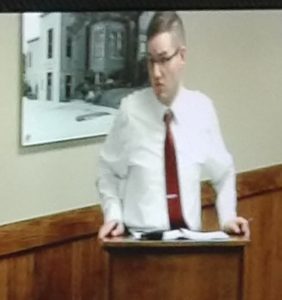Atlantic Mayor institutes the Pledge of Allegiance at Council meetings; FY 2021 budget discussed
February 19th, 2020 by Ric Hanson
Atlantic Mayor Dave Jones, Wednesday evening, announced that because the Disabled American Veterans group he belongs to, requested the Pledge of Allegiance be established as a regular part of City Council meetings, he decided to institute it, effective with Wednesday night’s meeting.  Prior to leading the Council and those in attendance in reciting the Pledge, a video of Red Skelton’s recital and meaning of each word, was played (You often hear that version of the Pledge weekday mornings at around 6:50-a.m., on KJAN).
Prior to leading the Council and those in attendance in reciting the Pledge, a video of Red Skelton’s recital and meaning of each word, was played (You often hear that version of the Pledge weekday mornings at around 6:50-a.m., on KJAN).
In other business, the Council, following a required public hearing, passed a Resolution Adopting Fiscal Year 2021 Maximum Property Tax Dollars (as required by the State). A Public Hearing was also held on a proposal to enter into a General Obligation (G.O.) Solid Waste Management (SWM) Loan Agreement, prior to the vote to approve. And, they passed a Resolution “Setting March 4th, as the date for a Public Hearing on a Proposal to Enter into a G.O. Refunding Loan Agreement, and to Borrow Money Thereunder, in a principal amounts not to exceed $2.25-million.” Essentially, this would allow the City of refinance the remaining debt with a new, short-term bond, resulting in an interest savings over the term of nearly $53,000.
The Council discussed, and at the recommendation of the Mayor, punted to the Community Protection Committee for discussion next month, the issue of parking on north side of East 12th Street, which is a dead-end located just east of the Heritage House. Parking is allowed on both sides of the street, which one property owner says obstructs the passage of standard vehicles through the street. There have also been concerns from the Police Chief and Street Superintendent with getting police, fire and street department vehicles through the area.

Atlantic City Admin. John Lund
And finally, City Administrator John Lund presented an overview of the FY 2021 Budget proposal. In his report, Lund said “Not a whole lot is changing with this budget.” Expenses are expected to be around $15.5-million. Over the next 10-years, he’s expecting about $170-million in expenditures and $181-million in revenues, along with about $27-million in Capital Improvement Projects ($11.3-million will be financed through debt).
The good news is that the Tax Levy is going down from $16.86 per thousand dollars valuation, to $16.56 in the next Fiscal year. Debt service and the Emergency Levy are also going down, because valuations were up enough and the actual debt obligations are unchanged. On the flip side, employee benefits will be on the rise, which nets out to around $100,000 in new property taxes. How much you pay, he says, will depend on your individual assessments, and the type of property you own.
Lund said utility rates will be unchanged, but the sewer system will require a more than $2-million in Capital Improvement eventually, and for that to happen, Lund says we’ll have to raise the wastewater rates. How much will be determined by the Personnel and Finance Committee, down the road. No specific timetable for the increases will be made until the Iowa DNR announces when improvements to the treatment plant have to be made to handle phosphorus and nitrate reductions.
Lund said he expects the City’s labor costs to increase 4%, the next fiscal year. Health insurance premiums will increase $40,000 per year, including an increase in IPERS and FICA. Inevitably, Lund says the Health Insurance Levy will increase from $3.66 to $4.80…by the end of the DECADE. But by the end of the next decade, there is expected to be property tax relief, from the current $16.86, to $16.29/per $1,000 valuation.
Moving forward, Lund says, he’s concerned about retail trends, and the decline of retailers in Atlantic, and a reduced amount of contribution from the State to the Local Option Sales Tax through online sales. That could affect future Capital Improvement Projects. And, in his report, Mayor Dave Jones urged citizens of the community to fill out your Census survey in April, because an accurate count helps determine how billions of dollars in federal funding flow into states and communities each year. It also determines how many seats in Congress each state gets. When you respond to the census, your answers are kept anonymous. They are used only to produce statistics.





